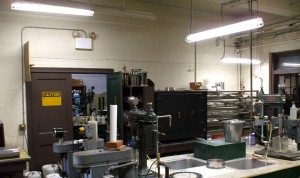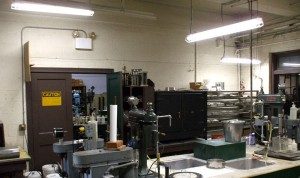Lighting upgrade cuts energy costs at NC State lab


At one of the world’s leading mineral labs, NC State engineers now work under brighter, energy-efficient lighting thanks to a recent upgrade that reduced lighting electrical use by 75 percent.
In January more than 100 outdated lighting fixtures at the Asheville, N.C.-based NC State Minerals Research Lab were replaced with LED technology, resulting in improved lighting quality and reduced energy consumption.
“The improvement is dramatic,” said Fred Thompson, who works at the lab and is the building’s liaison to NC State’s Facilities Division.
The retrofit was jointly funded by NC State’s Energy Management, the NC Cooperative Extension, and the College of Engineering of which the lab is part. With the added bonus of a Duke Progress Energy rebate, the upgrade pays for itself in less than three years through avoided energy costs.
“Upgrading the lighting made sense on many levels. This project supports the university’s move toward greater energy efficiency and provides significantly better lighting for the building,” said John Royal, the College of Engineering’s Specialist for Building Construction and Management.
In addition to energy savings and improved work conditions, the LED upgrade reduces maintenance costs since the technology lasts much longer than traditional incandescent or fluorescent lighting.
“The lab’s obsolete lighting was exactly what we look for when we make an investment in LED technology,” said Claudia Powell, an Energy Management program coordinator who coordinated the retrofit. “It doesn’t take long to recoup the initial investment through avoided utility and maintenance costs.”
The lab, which evaluates processes for industrial minerals beneficiation, has been part of the College of Engineering since the 1950s and plays a critical role in the understanding and development of mineral resources in North Carolina and worldwide.